The Uncaused Cause
By the word of the Lord the heavens were made,
And by the breath of His mouth all their host.
He gathers the waters of the sea together in a water skin;
He lays up the deeps in storehouses.
Let all the earth know the Lord;
Let all the inhabitants of the world stand in awe of Him.
– David, Third King of Israel and Judah (1035-970 BC), Psalm 33:6-8
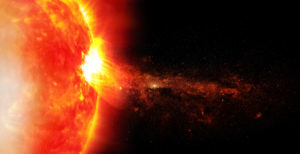 Scientific theories of how the universe began don’t actually explain how the universe began. We are told now that some 13.8 billion years ago this universe was just a tiny point of very dense matter and energy. And then, for reasons that scientists expect to be able to explain at any moment, that tiny point exploded and became this still-expanding universe. Well, okay. But where did that first speck of matter and energy come from? What came before the Big Bang?
Scientific theories of how the universe began don’t actually explain how the universe began. We are told now that some 13.8 billion years ago this universe was just a tiny point of very dense matter and energy. And then, for reasons that scientists expect to be able to explain at any moment, that tiny point exploded and became this still-expanding universe. Well, okay. But where did that first speck of matter and energy come from? What came before the Big Bang?
When you ask this question, you get a variety of frankly unresponsive answers. For example, eighteen years ago George Musser, the astronomy editor of Scientific American, wrote, “In some ways, you can think of the universe as a black hole turned inside out. A black hole is a singularity into which material flows. The universe is a singularity out of which material has flowed. A black hole is surrounded by an event horizon, a surface inside which we cannot see. The universe is surrounded by a cosmological horizon, a surface outside of which we cannot see.” Well, okay. But then, where did that first inverted black hole come from?
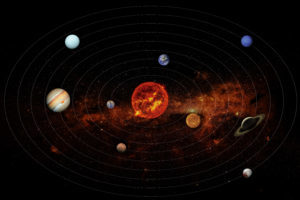 The Big Bang theory cannot explain how something came from nothing. Nor does it explain how this universe can have randomly existed for fourteen billion years within tiny value tolerances of more than two dozen factors that together keep it from either collapsing in on itself or blowing apart, when the likelihood of its existing this way by accident is so remote as to beggar belief. So the existence of this universe and its ability to be stable over eons of time is sometimes explained by assuming that various Big Bangs must have happened constantly in their endless billions. And among them all, the one that resulted in this universe may be the only one – or one of the few – which happened to get those tolerances right. For example, Discover magazine tells us that “Cosmologist Alexander Vilenkin believes the Big Bang wasn’t a one-off event, but merely one of a series of big bangs creating an endless number of bubble universes.”
The Big Bang theory cannot explain how something came from nothing. Nor does it explain how this universe can have randomly existed for fourteen billion years within tiny value tolerances of more than two dozen factors that together keep it from either collapsing in on itself or blowing apart, when the likelihood of its existing this way by accident is so remote as to beggar belief. So the existence of this universe and its ability to be stable over eons of time is sometimes explained by assuming that various Big Bangs must have happened constantly in their endless billions. And among them all, the one that resulted in this universe may be the only one – or one of the few – which happened to get those tolerances right. For example, Discover magazine tells us that “Cosmologist Alexander Vilenkin believes the Big Bang wasn’t a one-off event, but merely one of a series of big bangs creating an endless number of bubble universes.”
This idea that there could have been infinite random Big Bangs but maybe ours was the only one whose resulting universe was stable has been a comforting one in scientific circles for decades. But of late, Professor Vilenkin is thinking more in terms that make possible just one universe that had a clear beginning. Again from Discover, eight years ago: “‘We have very good evidence that there was a Big Bang, so the universe as we know it almost certainly started some 14 billion years ago. But was that the absolute beginning, or was there something before it?’ asks Alexander Vilenkin, a cosmologist at Tufts University near Boston. It seems like the kind of question that can never be truly answered because every time someone proposes a solution, someone else can keep asking the annoying question: What happened before that? The universe had a distinct beginning — though he can’t pinpoint the time. After 35 years of looking backward, he says, he’s found that before our universe there was nothing, nothing at all, not even time itself.” And in the sheltered beliefs-based world of modern materialist science, that assertion that time did not exist before the Big Bang apparently resolves all origin questions! The author of this Discover article adds, “One virtue of this picture, if correct, is that the spontaneous creation of our universe gives a definite starting point to things. Time begins at the moment of creation, putting to rest the potentially endless questions about ‘what happened before that’.”
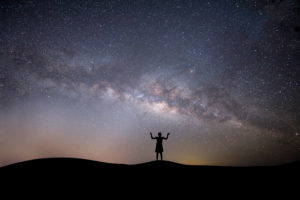 But of course, it does nothing of the kind. It is not the fault of the scientists mentioned here that their work is constrained by the century-old scientific dogma of materialism! You and I know that time is merely a correlate of the matter that modern scientific orthodoxy abundantly confirms is less than five percent of what exists. And we have seen so much detailed and consistent evidence that a whole lot actually goes on beyond material reality that our greater perspective shows us that the lack of time that existed before the Big Bang actually settles nothing. The Reality beyond this physical universe is devoid of matter, energy, time, and space. All true. But still, it teems with intelligent and amazingly solid-seeming life!
But of course, it does nothing of the kind. It is not the fault of the scientists mentioned here that their work is constrained by the century-old scientific dogma of materialism! You and I know that time is merely a correlate of the matter that modern scientific orthodoxy abundantly confirms is less than five percent of what exists. And we have seen so much detailed and consistent evidence that a whole lot actually goes on beyond material reality that our greater perspective shows us that the lack of time that existed before the Big Bang actually settles nothing. The Reality beyond this physical universe is devoid of matter, energy, time, and space. All true. But still, it teems with intelligent and amazingly solid-seeming life!
The century-old imposition of “the scientific dogma of materialism” is grounded in the notion that science is fighting an intellectual guerrilla war against religions. To fight this war, the university departments and the peer-reviewed journals cracked down more than a century ago and established a dogma that effectively turned mainstream science into just one more religion: in this case, they established the religion of No-God. And in fact, since indeed there is no God of the sort that any religion has imagined, but there is instead an infinitely creative force to which scientists are required by those who control their profession to remain officially blind, scientists have been rendered incapable of ever answering the three biggest questions:
What is consciousness, and where does it come from?
What is life, and where does it come from?
How did the universe begin?
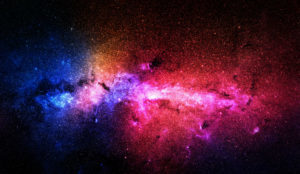 We have talked here about the first two questions, to which scientists have convinced themselves they are well on the way toward finding matter-based answers. They assume that consciousness must be created in the brain, and life originated when lightning struck a chemical soup, so if they can just sufficiently study the brain and keep on playing with chemical combinations they will one day solve the mysteries of both consciousness and life. Any day now! Their suppositions are wrong, since consciousness pre-exists matter and life is a property of consciousness. But since their presumptions about consciousness and life are not falsifiable without looking beyond their materialist dogma, their searches for the source of consciousness and the origin of life are giving many scientists nicely funded, if mostly pointless, careers. But the origin of the universe is another matter. There is no way to build a career on researching what might have come before the Big Bang, so the scientific community hopes to end all annoying inquiries about what actually came first by declaring that before time began there simply was nothing.
We have talked here about the first two questions, to which scientists have convinced themselves they are well on the way toward finding matter-based answers. They assume that consciousness must be created in the brain, and life originated when lightning struck a chemical soup, so if they can just sufficiently study the brain and keep on playing with chemical combinations they will one day solve the mysteries of both consciousness and life. Any day now! Their suppositions are wrong, since consciousness pre-exists matter and life is a property of consciousness. But since their presumptions about consciousness and life are not falsifiable without looking beyond their materialist dogma, their searches for the source of consciousness and the origin of life are giving many scientists nicely funded, if mostly pointless, careers. But the origin of the universe is another matter. There is no way to build a career on researching what might have come before the Big Bang, so the scientific community hopes to end all annoying inquiries about what actually came first by declaring that before time began there simply was nothing.
I have been watching the scientific community beclown itself this way for fifty years. There had been a gentlemanly separation between material and spiritual areas of inquiry going back at least as far as Plato and Aristotle, but it wasn’t made formal until the first part of the twentieth century. My research suggests that “the fundamental scientific dogma of materialism” was imposed by the university departments and the peer-reviewed journals in response to the simultaneous advent of quantum mechanics and a sudden flood of post-death communications that were being collected and documented by researchers for scientific study. It was all too much, too crazy, and too fast! So announcing their new dogma seemed like a good idea at the time, although they quickly stopped mentioning it in print. But still, that dogmatic barrier to an open-minded search for the truth remains, and it governs all of mainstream science.
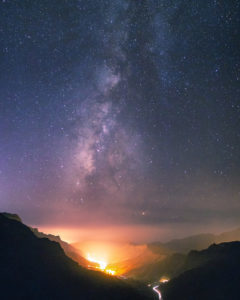 The more I think about how we might end this conundrum that holds our entire scientific community stuck now a century into the past, the more I am coming to realize that St. Thomas Aquinas (1225-1274) had the right idea. In his Summa Theologica he offered five proofs for the existence of God, all of which can be boiled down to one. There has to be an Uncaused Cause. Even the notion that nothing existed before time began begs the question! What caused time, space, energy, and matter even to begin at all?
The more I think about how we might end this conundrum that holds our entire scientific community stuck now a century into the past, the more I am coming to realize that St. Thomas Aquinas (1225-1274) had the right idea. In his Summa Theologica he offered five proofs for the existence of God, all of which can be boiled down to one. There has to be an Uncaused Cause. Even the notion that nothing existed before time began begs the question! What caused time, space, energy, and matter even to begin at all?
There is no way around this problem. It exists in many areas of scientific inquiry, but the one place where scientists cannot duck it is in the question of what came before the Big Bang. And then what came before that. And what came before that. The modern scientific approach reminds us of the story of an ancient traveler who was told by some sage that the world rides on the back of a turtle. When the sage was asked what the turtle was riding on, he said it was standing on another turtle. And what was that turtle standing on? The sage said, “It’s turtles all the way down.” We smile at that story because we know that the bottom turtle has to be standing on something real and not reptile! In every area of human inquiry there is an unacknowledged Uncaused Cause.
 Of course, religions have been no better at finding the genuine Uncaused Cause than mainstream science has been, and science refuses to look for It. In truth, the Uncaused Cause is far more wondrous than any of us now can imagine! Last year we made some predictions about what humankind will eventually be learning about the Godhead and the greater reality, and we here reiterate those predictions. If you are young now, you may still be in a body when truth eventually overtakes both science and religion, and then for all of suffering humankind reality at last will be allowed to dawn. And in that splendid future day, just know that Craig Hogan and I and many other researchers are joyously right there with you watching it happen and giving you high-fives from the bleacher seats!
Of course, religions have been no better at finding the genuine Uncaused Cause than mainstream science has been, and science refuses to look for It. In truth, the Uncaused Cause is far more wondrous than any of us now can imagine! Last year we made some predictions about what humankind will eventually be learning about the Godhead and the greater reality, and we here reiterate those predictions. If you are young now, you may still be in a body when truth eventually overtakes both science and religion, and then for all of suffering humankind reality at last will be allowed to dawn. And in that splendid future day, just know that Craig Hogan and I and many other researchers are joyously right there with you watching it happen and giving you high-fives from the bleacher seats!
For He spoke, and it was done;
He commanded, and it stood forth.
The Lord nullifies the counsel of the nations;
He frustrates the plans of the peoples.
The counsel of the Lord stands forever,
The plans of His heart from generation to generation.
Blessed is the nation whose God is the Lord.
– David, Third King of Israel and Judah (1035-970 BC), Psalm 33:9-12
The post The Uncaused Cause appeared first on Roberta Grimes.



